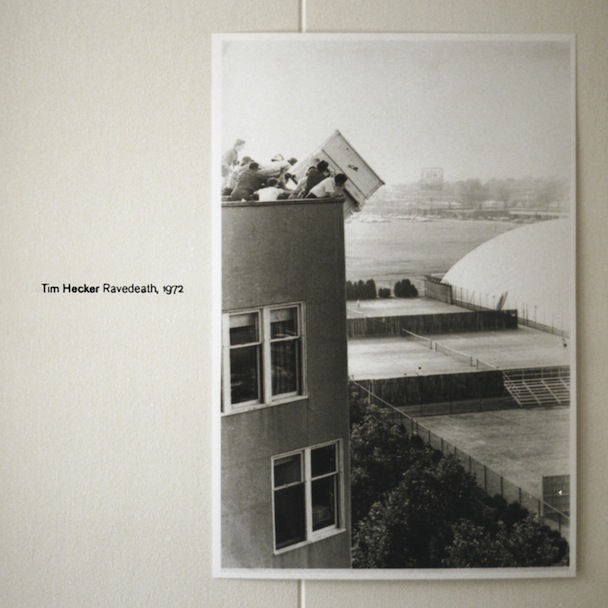It’s all too easy to associate ambient music with winter and isolation, and while the same holds true for Ravedeath, 1972, it side steps convention with an inspired recording process that marries both live improvisation and studio refinement. That it was recorded in an abandoned church in the chill of fall seems entirely natural, and was likely a necessary setting to achieve the desired end result. Importantly, it never sounds like a live recording. The pipe organ used to create most of the sounds is never distinct or recognizable enough to sound cheesy or overdone; many may not identify an organ as the source of the music at all. As you would expect of a Hecker piece, the heavy trembling of opening track “The Piano Drop” makes no tip of the hand to reveal the organic recording process which occurred. Hecker’s now characteristic mastery of restraint results in an album that doesn’t sound like a rule breaker, at least not at first listen, but rules are bent in subtle ways that allow Ravedeath to quietly stand a shade taller than many of its peers.
Somewhat the antithesis of Harmony in Ultraviolet‘s violently raptured surface, Ravedeath is largely a barren deconstruction of past Hecker complexes. This is apparent no more so than on the barely there valley of “No Drums,” which serves as the rear end of an almost unnoticeable decrescendo spanning the three song “In the Fog” suite before swelling into what is a landmark of the album in “Hatred of Music I.” I use the word ‘landmark’ in relative terms; a windy, gloom-ridden hill is as high as the album cares to reach for. Hecker clearly has no interest in emulating a “masterpiece” or a record with crossover appeal, and for that some will be thankful and some will be indifferent. For my part, it is exactly what it needs to be and nothing more.
Lingering piano chords slip over the droning throb of the buried pipe organ, permeating the unsettled atmosphere, occasionally to rise out of the sharp haze to cinematic effect, as if tying all the loose ends of the story into a twisted, frostbitten bow. Possibly the distant ice-rattled echoes of the all too predictable tones of An Imaginary Country, the occasional recurrence of these wispy plucks is always a treat, especially with the closing chimes of “In the Air III.” Hecker is an artist who rarely indulges, but when he does it’s in a method so oddly seductive that there is never any danger that you might feel compelled to take a step back. Rather, he offers just enough to lure listeners in, and I suspect that for each there will be a moment of awe, several listens in, at which point the unsuspected depth of Ravedeath suddenly becomes overwhelmingly apparent. It’s hard to say whether Ravedeath, 1972 will go down as a fan favorite, but it doesn’t need to and it frankly isn’t interested. It makes its own statement, and it does so with the level of maturity and succinctness that we’ve come to expect from Hecker, an artist who has well earned his place as a leader amongst his peers.


